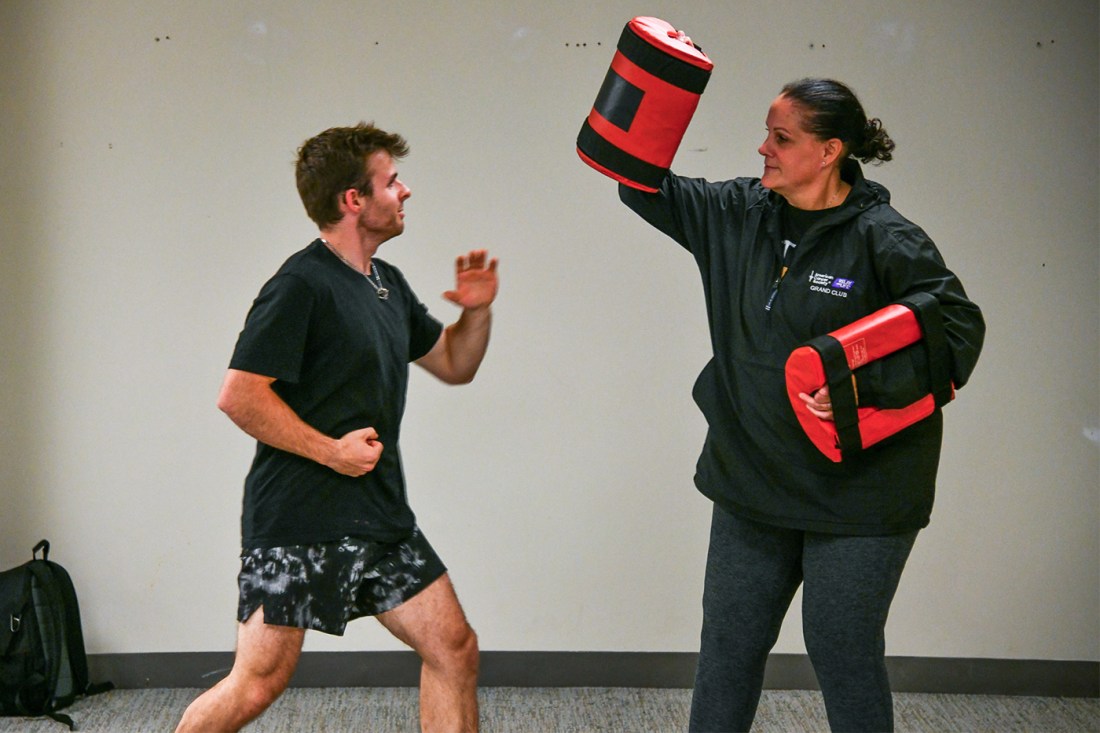The power of a loud ‘No’ and other skills you can learn in free NUPD self-defense classes
NUPD’s free self-defense classes help Northeastern students, staff and faculty sharpen awareness, build confidence and learn practical skills to stay safe.

If you happen to be in ‘Northeastern University’s Renaissance’ Park building in Boston after hours, you might hear a chorus of voices shouting a firm “No!” coming from the eighth floor.
Using their voices is the first and the most important lesson participants learn in the Northeastern University Police Department’s basic self-defense class, free to students, staff, faculty and the general public.
“Your voice is your number one weapon,” says Northeastern Police Officer Anika Crutchfield. “If you can yell and ward off an attacker before anything ever happens, you’re winning the fight … because you don’t have to fight.”
Anyone from “an 8-year-old to an 80-year-old” can learn basic self-defense, says Crutchfield, a member of NUPD’s Community Engagement Unit and one of six officers who teach self-defense classes.
“If you have zero skills, have never been in a fight, you can still take this information and learn how to create a basic foundation … to be able to defend yourself,” she says.
NUPD’s full self-defense program includes a 2.5-hour basic training, two back-to-back 2.5-hour advanced classes and a two-hour aerosol defense class, in which participants learn how to use pepper spray safely. The program is designed to accommodate participants of any gender.
In the last two years, nearly 950 members of the Northeastern community have taken advantage of the basic class. Participants learn basic safety tips, situational awareness, what can be used as a personal weapon, how to hold themselves when facing danger, and how to execute a proper punch or a kick.



Zoe Petroianu, a third-year exchange student from Amsterdam studying computer science, attended a basic self-defense class in September taught by Crutchfield and Officer Armando Soto. She says the most memorable lesson for her was to use her voice.
“I didn’t even think of that as a way to defend myself, because naturally, I just thought of using my body parts,” she says.
Watching the instructor yell in class, she says, showed her how intimidating it can be.
Most crimes happen because perpetrators walk “under an invisible cloak,” Crutchfield says, when nobody around is paying attention. Attackers can take someone’s wallet or a cellphone and get away with it, if the victim doesn’t make any noise.
Getting loud — yelling, “No! I don’t know you! I’m not giving this to you!” — can draw enough attention to scare off the attacker or alert bystanders.
“If somebody is going to attack you, they’re counting on us being quiet, especially with women,” Crutchfield says.
Editor’s Picks
The class mixes physical drills with scenario-based discussions.
Julia Rugani, a second-year civil engineering student, says she signed up for the basic class because she often walks around Boston by herself and wanted to learn practical skills to protect herself if needed. She found some moves rather easy, while others, like the knee kick, were a bit more challenging.
“Certain skills, like the knee kick, were really difficult for me to recall when it got more high-stress,” she says. “There were just a lot of things to think about, which is part of the reason I wanted to take the class so I wouldn’t freeze up.”
Learning the basics of self-defense is not a one-and-done thing, Crutchfield says. In a stressful situation, when people experience a rush of adrenaline, they tend to forget a lot of what they once learned. That is why she encourages people to retake the basics class multiple times to practice and build muscle memory.
In the advanced classes, NUPD instructors teach participants additional moves and create individual mock “attack” scenarios to help them put new skills into action in a safe, controlled environment.
Both students and instructors wear protective body and head gear. During the “attack,” they practice repeating key steps: using their voice, finding exits to escape and, if there is no way to get out of the situation, fighting to defend themselves.
“It now allows you to see that what you’ve learned works,” Crutchfield says.
“I feel a lot more prepared,” says Rugani after completing the class. “I feel more confident in my ability to do things even in a high-stress situation.”
Petroianu also expressed more confidence after the class.
“I feel more empowered and ready to defend myself in the real world,” she says. “But I definitely think I need to practice more.”
She plans to take at least one more self-defense class before returning to Amsterdam.
Crutchfield says she loves teaching self-defense classes because she sees that participants feel more confident and empowered after they learn to “escape” an attack.
“This is why we’re passionate about this class,” she says.
Those interested in joining can sign up for free self-defense classes or a low-cost CPR class through the NUPD website or find out when the next class is from the NUPD social media accounts on Instagram, Facebook or X. Private group sessions are also available upon request.





